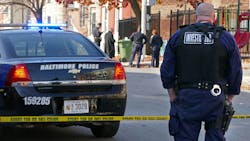Baltimore Police Union Advises Officers to Answer Integrity Questions
By Jessica Anderson
Source The Baltimore Sun
BALTIMORE -- Reversing earlier guidance, the union that represents Baltimore police officers is now directing its members to answer a new set of questions being posed by prosecutors to identify possible integrity problems.
“Going forward, we very strongly urge all members to answer the questionnaire to the best of your ability,” Lt. Gene Ryan, the president of Fraternal Order of Police Lodge 3, said in a statement obtained by The Baltimore Sun.
The statement came after interim Police Commissioner Gary Tuggle ordered officers to comply with the questionnaire or face disciplinary action.
In March, the office of Baltimore State’s Attorney Marilyn J. Mosby issued a list of questions for officers who might be called to testify as witnesses in criminal cases. The office asked officers about their internal affairs records, whether they have ever been sued or sued anyone else, whether they have ever been charged with crimes or traffic violations, and whether they have ever received time off from work in exchange for securing evidence in a case.
Prosecutors described the questionnaire as an effort to ensure integrity among testifying officers after they were forced to drop scores of cases involving members of the corrupt police Gun Trace Task Force.
Eight officers on the task force were convicted this year of federal racketeering charges. Critics said some of them should have been flagged for integrity problems long before their federal convictions.
The Baltimore police union has advised its members not to answer questions being posed by prosecutors to flush out potential integrity issues of police witnesses, saying they go beyond the internal affairs disclosures mandated under a March agreement between prosecutors and city attorneys.
The union previously advised officers not to respond to the questions, saying they were invasive and not related to their internal affairs files. A lawyer for the union said that officers told him the questions went beyond those asked by other agencies, such as the U.S. Attorney’s Office.
Ryan said he still feels the questions go too far. But after Tuggle’s order, he’s advising officers to answer them.
“If you read the questions, it’s ridiculous,” he said. “But the commissioner asked us to fill it out.”
Police spokesman T.J. Smith said the department has been working with the state’s attorney’s office to make sure officers comply with disclosure laws.
“The Commissioner found it necessary to order officers to comply to preserve the necessary prosecution of defendants,” Smith said in a statement. “We are continuing to work to a fair agreement for all parties in the best interest of judicial system.”
Melba Saunders, a spokeswoman for Mosby, said about 908 officers have been asked to complete the questionnaires, and 790 of them refused to comply.
Of those 790, 667 were Baltimore police officers. The others, she said, were from different law enforcement agencies that work in the city.
Saunders said one case was dismissed because an officer refused to answer the questionnaire.
An ongoing review by the Baltimore state’s attorney’s office has whittled down the number of cases affected by the Police Department’s corrupt Gun Trace Task Force from nearly 3,000 to about 1,700, Marilyn J. Mosby told the City Council this week.
Mosby said at a budget hearing Monday night that...
“Following the unfortunate findings of the [Justice Department] investigation into [the Baltimore Police Department], the [Gun Trace Task Force] convictions, and several other incidents involving police misconduct, our office developed and instituted a questionnaire as part of a new process, to increase transparency, efficiency, and trust within our local criminal justice system,” Saunders said in a statement. “This instruction and non-compliance was to the dismay of not only our attorney but also the judge, who ultimately dismissed the case due to their actions."
In a statement dated Friday, Ryan, the union president, told officers to respond to the questions and write on the form “I have been ordered to answer these questions by the BPD. The answers I have provided are to the best of my knowledge and belief.”
Ryan told officers that Tuggle’s order “will protect your from any consequences that might arise from the answers you provide on the questionnaire. Any information you submit cannot be used against you.”
He cited a 1967 Supreme Court opinion, in which the court held that a group of New Jersey officers who were accused of fixing tickets were coerced into answering questions out of fear that they would lose their jobs. The court ruled that such answers could not be used against the officers in subsequent criminal proceedings.
“We conclude that policemen, like teachers and lawyers, are not relegated to a watered-down version of constitutional rights,” the court said.
Baltimore Sun reporter Justin Fenton contributed to this article.
———
©2018 The Baltimore Sun
Visit The Baltimore Sun at www.baltimoresun.com
Distributed by Tribune Content Agency, LLC.



